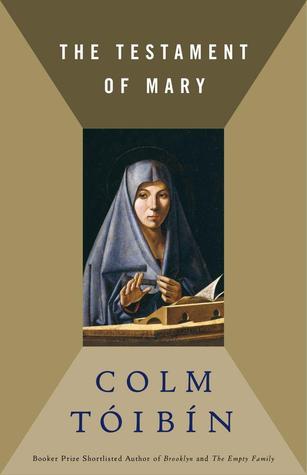 Rating: 2
Rating: 2The Testament of Mary
A Novel by Colm Toibin
2012 / 96 Pages (56 in PDF format)
Synopsis:
In the ancient town of Ephesus, Mary lives alone, years after her son's crucifixion. She has no interest in collaborating with the authors of the Gospel—her keepers, who provide her with food and shelter and visit her regularly. She does not agree that her son is the Son of God; nor that his death was “worth it;” nor that the “group of misfits he gathered around him, men who could not look a woman in the eye,” were holy disciples. Mary judges herself ruthlessly (she did not stay at the foot of the Cross until her son died—she fled, to save herself), and is equally harsh on her judgment of others. This woman who we know from centuries of paintings and scripture as the docile, loving, silent, long-suffering, obedient, worshipful mother of Christ becomes, in Toibin’s searing evocation, a tragic heroine with the relentless eloquence of Electra or Medea or Antigone. This tour de force of imagination and language is a portrait so vivid and convincing that our image of Mary will be forever transformed.

Review:
I must preface my review with the statement that I do not care to share my opinions on religion and politics. They are both very personal and influenced by geography, familial tendencies, life experiences, etc. That said, The Testament of Mary by Colm Toibin could not be a more controversial religious novel that has been long listed for the Booker prize and I need to review it.
I have a too biased opinion of the subject matter to have read this objectively. I tried to read it without injecting my own religiosity, but on page 13, Toibin slaps the face of Catholic/Protestant believers by inferring that Mary has rejected God and has decided to find comfort in the idol, Artemis. We are talking about a woman so pure, physically and spiritually, that God chose her to bear his Son so that we all may have eternal life. Some may think that the horror of seeing her Son crucified on the cross could drive her away from the spiritual teachings of Judaism, but I don't see it that way. So, my review is tainted with my own bias.
Beyond the insult of becoming an idol worshiper, Toibin also takes great liberty in rearranging some biblical history. Readers of historical fiction will typically scream bloody murder when an author changes facts to make his story work better. We typically won't see a book where Anne Boleyn is beheaded before the divorce and eventual death of Henry VIII's first wife, Catherine (although I am sure Catherine would have been okay with that). In The Testament of Mary, Toibin decides that Jesus' greatest miracle, raising Lazarus from the dead, happened before His first miracle, changing water into wine. Both of these stories are very important in the history of Jesus and to change them to fit the story just irks me.
Trying to look at this novel as a work of fiction and taking all of my Southern Sunday School lessons out of the equation, I still believe this book falls flat. A book about Mary, the mother of Jesus, should be a heart-felt tome. I think you could ask a class of 5th grade Catholics or Protestants to write a paper about how Mary felt raising Jesus and you would get a more honest and heart wrenching depiction of her. My ebook only had 56 pages while the hard back has 96. It reads as if someone told Toibin to jot some stuff down and he would be a shoe in for a chance for a long list nomination. Even with the controversial issues in the book, had Toibin written with more heart wrenching emotion, I could have respected the book more. Throw in some early history that is missing from religious text about how she felt raising her children (and where are the other children?) and her relationship with Joseph.
Some may see more out of this book than I did. I just could not get past my own beliefs to justify a long list nomination for this one.
No comments:
Post a Comment